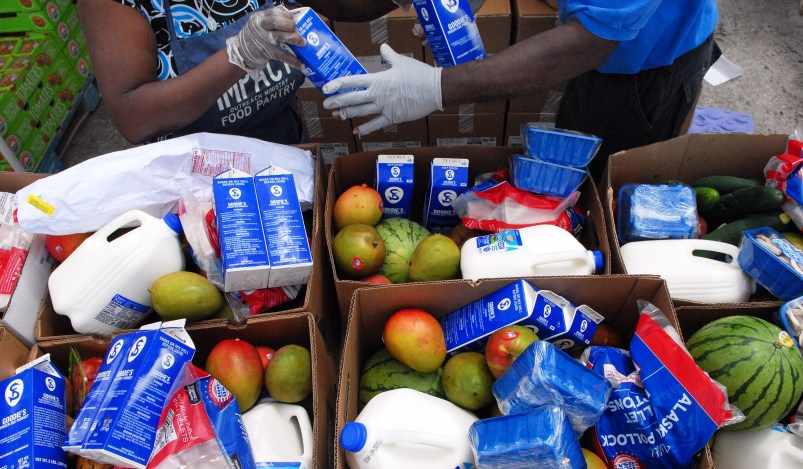This article is part of TPM Cafe, TPM’s home for opinion and news analysis.
The coronavirus has laid bare the depth of our society’s inequality, not just through mortality rates that diverge sharply by race and class but also in wildly disparate access to food. Upper-middle-class people joke about taking up sourdough bread-baking with spare time while thousands of desperate people spent their night in cars lined up for blocks waiting for the San Antonio Food Bank to open.
Food is what unites us: we all need it, and since time immemorial we have used food to express our culture, our religious beliefs, our hospitality and our status. Yet for many of the same reasons, food creates one of our greatest vulnerabilities.
The need for food forces the vulnerable among us to take chances that can prove deadly in the current crisis. Many frightened people with heightened risk factors continue in dangerous jobs — supermarket clerks, letter carriers, delivery people — because the alternative is going without. More and more, they and their family members are getting sick.
Even in the relatively strong economy before the pandemic, 15 million U.S. households — more than one in ten — were food insecure. Food insecurity is the lack of sufficient resources to consistently obtain enough food for a normal life. Many more Americans were surviving only paycheck-to-paycheck. Now that those paychecks have suddenly disappeared for tens of millions of workers, countless more people are becoming frantic about how to feed their families.
In addition to the sudden disappearance of jobs, our other defenses against hunger are collapsing. Tens of millions of low-income children lost access to free and reduced-price breakfasts and lunches when their schools closed. Tens of millions more have lost access to subsidized meals in child care centers. The summer food programs that try to fill the gap when schools close will face formidable challenges this year.
Our country is on the brink of the most widespread hunger crisis since the 1930s. Sadly, we face this specter dreadfully ill-equipped. Just as the 2008 financial crisis exposed our failure to heed the Great Depression’s lessons and our response to COVID-19 showed unwarranted complacency about public health, we have seriously weakened our nutrition safety net over the years.
For example, even a three-month bout of unemployment is enough to get a childless adult below age 50 ejected from the Supplemental Nutrition Assistance Program (SNAP, the successor to food stamps). SNAP benefits average only $1.33 per person per meal. The Trump Administration has been hard at work trying to cut SNAP further. Staffing cuts made during the Great Recession have not been restored, leaving state SNAP agencies ill-prepared to handle the tsunami of applications that are now hitting them.
To date, our response to increased food insecurity amid the pandemic has been woefully inadequate. A federal court did block the Administration’s attempt to throw almost a million additional people off SNAP, and Congress suspended the program’s three-month time limit. But the administration has aggressively resisted efforts to help the newly desperate.
Congress authorized states to provide emergency food assistance allotments to eligible low-income households to cope with increased costs during this period. This is crucial because vulnerable households cannot employ their usual strategies to stretch SNAP benefits: the cheapest food items are often sold out, shopping at several stores in search of sales is risky and home-delivered groceries are expensive. Congress capped these new emergency allotments at roughly $1.78 per person per meal. The administration ignored the law to impose its own, much-lower, cap that resulted in the poorest households receiving no emergency allotments at all and only the least-poor getting amounts approaching what Congress approved.
Congress did allow states to provide emergency food assistance directly to families to make up for lost school meals. But only on April 9 — more than three weeks later — did the administration let the first state go ahead.
When Congress was drafting legislation to provide emergency crisis relief payments to people who lost their jobs, the administration adamantly opposed proposals to use the SNAP rolls to identify those newly in need. Instead, it insisted that the job be assigned to the IRS, whose earnings information is one to two years old. Many of the poorest families — those whose incomes were so low that they were not required to file a tax return — will be excluded altogether from the emergency payments.
The administration and congressional Republicans held up their own legislation for more business loans because Democrats wanted to pair it with a 15% temporary increase in SNAP benefits.
Inadequate nutrition weakens immune responses to diseases like COVID-19. And people desperate to feed their families take risks that jeopardize us all. More fundamentally, at a time when we should all be pulling together, our tepid response to hunger is unforgivable.
David A. Super is a professor at Georgetown University Law Center.







It’s just disgusting.
For the life of me, I can’t understand how someone rationalizes voting Reactionary.
And this ‘paltry’ effort is a surprise? To anyone? So long as Republicans have held sway, this is standard operating procedure and has been for as long as I can remember.
Since our federal government is too busy propping up rich people, supporting organizations that step in during these situations is key.
When you can’t even provide red meat for your NeoNazi followers, it’s time to realize you are not and never were the Second Coming of God.
I wonder if Trump knows what happens to false prophets in the Bible? Probably not. He doesn’t read anything. And those that read to him have to make sure it’s only good news.
Well, yeah, but the list of Trump’s “unforgivable” crimes and sins is already pretty fucking long.